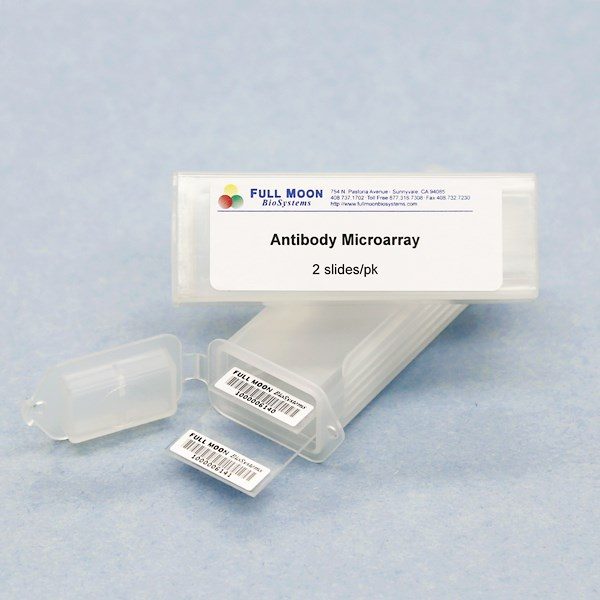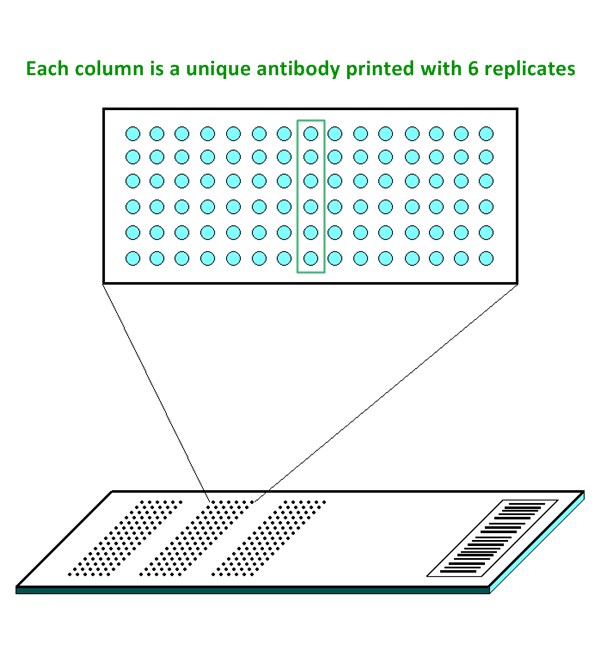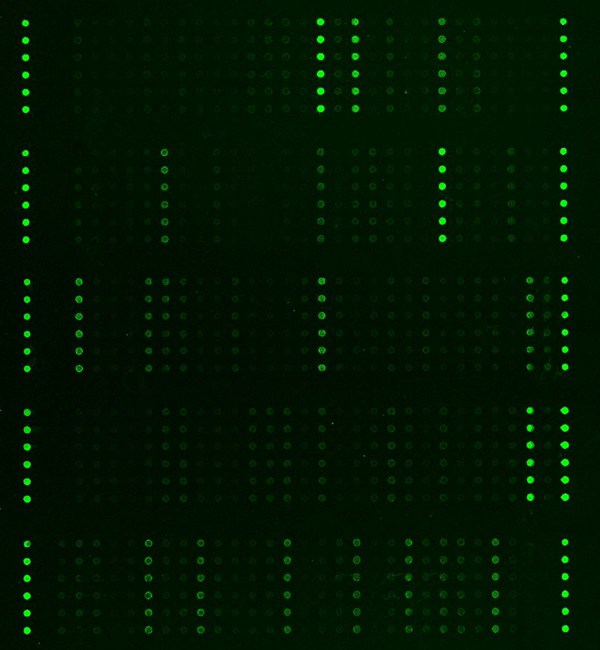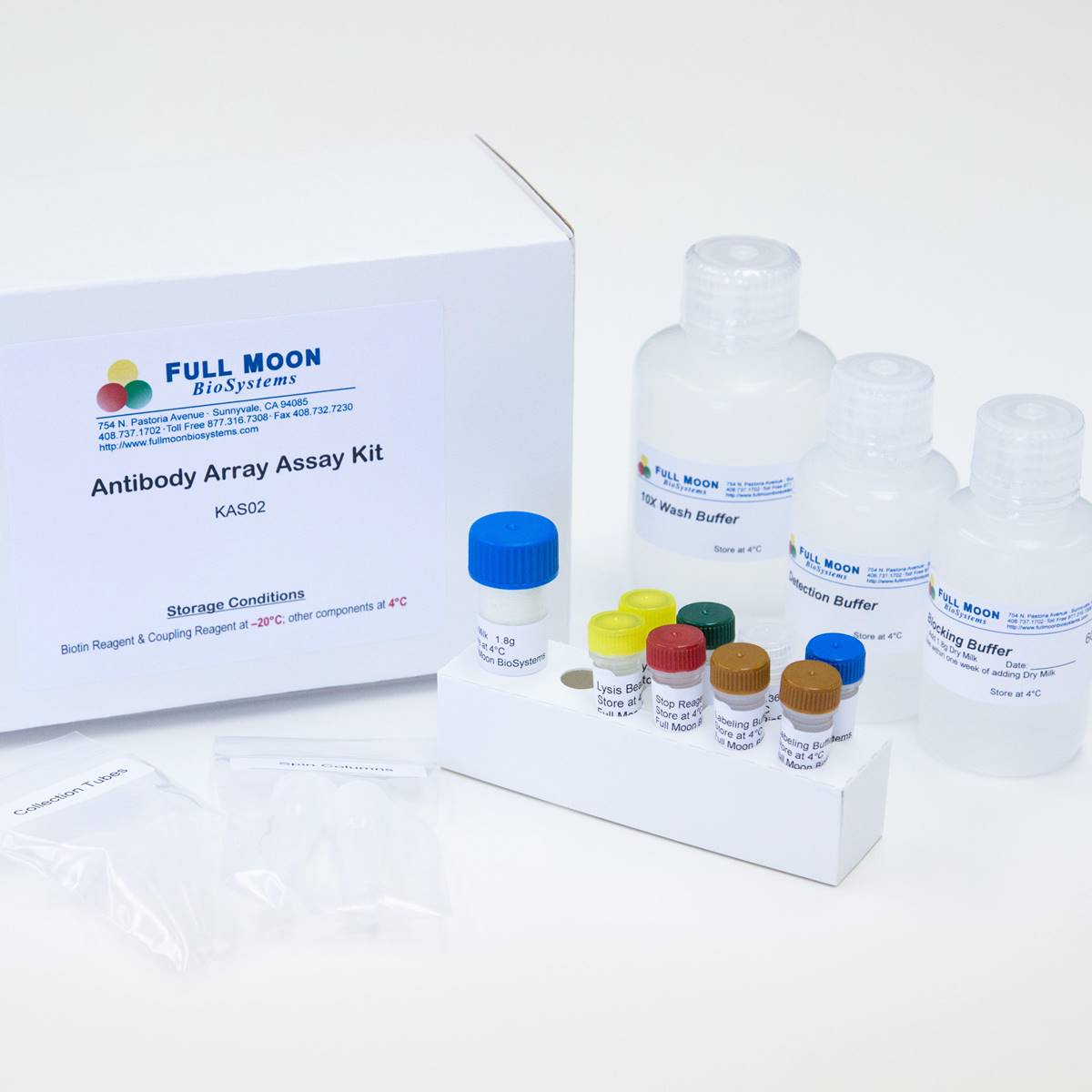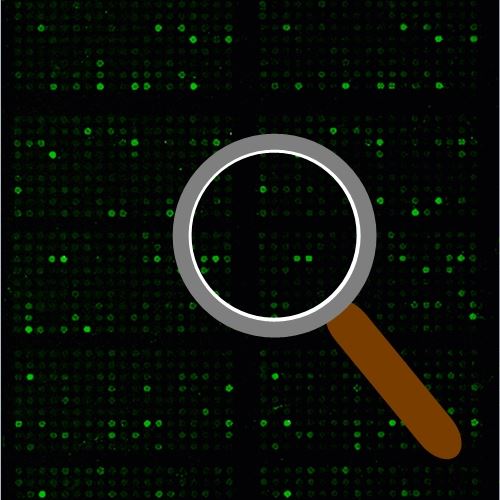Cell Cycle Phospho Antibody Array
Cell Cycle Phospho Antibody Array is a high-throughput ELISA based antibody array for qualitative protein phosphorylation profiling. It is suitable for comparing normal samples to treated or diseased samples, and identifying candidate biomarkers. This array features site-specific and phospho-specific antibodies, allowing researchers to study tyrosine, serine, and threonine phosphorylation at specific sites.
Key Features
- Site-specific phosphorylation profiling and screening with 76 antibodies
- Antibodies covalently immobilized on 3D polymer coated glass slide
- 6 replicates per antibody
- Fluorescent detection
Specifications
| Product Size: | 2 array slides per package for analyzing two samples (untreated vs. treated) |
| Featured Antibodies: | 76 site-specific and phospho-specific antibodies; 6 replicates per antibody |
| Reactivity: | Human: 100% |Mouse: 65% | Rat: 53% |
| Suitable Sample Type: | Cell lysate | Tissue lysate |
| Detection Method: | Fluorescence | Compatible Scanners |
| Internal Controls: | beta-actin | GAPDH | Negative controls |
| Slide dimensions: | 76 x 25 x 1 mm |
| Storage Condition: | 4°C for 6 months |
Product Details
ATM, BRCA1 (Ser1423), BRCA1 (Ser1524), c-Abl (Tyr412), CDC2 (Tyr15), cdc25A (Ser75), cdc25C (Ser216), CDK2 (Thr160), Chk1 (Ser280), Chk1 (Ser317), Chk1 (Ser345), Chk2 (Ser516), Chk2 (Thr68), GSK3a (Ser21), GSK3b (Ser9), HDAC4 (Ser632), HDAC5 (Ser498), HDAC8 (Ser39), Myc (Ser373), Myc (Thr358), Myc (Thr58), p21Cip1 (Thr145), p27Kip1 (Ser10), p27Kip1 (Thr187), p53 (Ser6), p53 (Ser9), p53 (Ser15), p53 (Ser33), p53 (Ser37), p53 (Ser46), p53 (Ser315), p53 (Thr18), p73 (Tyr99), p95/NBS1 (Ser343), Rb (Ser780), Rb (Ser795), Rb (Ser807), SMC1 (Ser957)
Beck AC, Cho E, AP-2alpha Regulates S-phase and is a Marker for Sensitivity to PI3K-inhibitor Buparlisib in Colon Cancer, Mol Cancer Res March 22 2021 DOI: 10.1158/1541-7786.MCR-20-0867
Carriere PP, Kapur N, Cinnamtannin B-1 inhibits cell survival molecules and induces apoptosis in colon cancer, Inl J Oncol, 2018 53(4):1442-1454
Higelina J, Catanesea A, NEK1 loss-of-function mutation induces DNA damage accumulation in ALS patient-derived motoneurons, Stem Cell Res, 2018, 30:150–162
Sobol A, Galluzzo P, Depletion of Amyloid Precursor Protein (APP) Causes G0 Arrest in Non-Small Cell Lung Cancer (NSCLC) Cells, Journal of Cellular Physiology, 2015 230(6): 1332–1341
Yalcin A, Clem B, Nuclear Targeting of 6-Phosphofructo-2-Kinase (PFKFB3) Increases Proliferation via Cyclin-dependent Kinases, Journal of Biological Chemistry 2009, 284:24223-24232
Services
If you don’t have access to a microarray, send the finished arrays to our lab for scanning. Raw scan images are delivered in tiff format.
Cost: Free
Array Image Quantification and Analysis Service includes data extraction, data organization and analysis of the array images obtained through our array scanning service.
Cost: $150 per slide
Complete Antibody Array Assay Service allows investigators to send research samples to our laboratory for analysis. There is no need to purchase the arrays and reagents and running the assays yourself. Simply select the array of your choice, and then send off the samples to our lab. This convenient hands-off approach offers quick turnaround and reliable results, saving you valuable time and resources. All assays will be performed by our highly trained scientists at our headquarter in Sunnyvale, California. Results are delivered by email in 1-3 weeks.
Cost: $1,240 per sample

